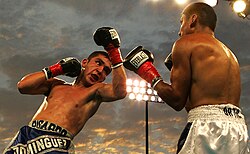Types of martial arts

- Martial arts by form – some examples include:
- Martial arts by region
The following outline is provided as an overview of and topical guide to martial arts:
Martial arts – systems of codified practices and traditions of training for combat. While they may be studied for various reasons, martial arts share a single objective: to physically defeat other persons and to defend oneself or others from physical threat. In addition, some martial arts are linked to beliefs such as Hinduism, Buddhism, Taoism, Confucianism, Sikhism, Zoroastrianism, Jainism, Islam, Chinese folk religion, Korean shamanism, Vietnamese folk religion, or Shinto while others follow a particular code of honor. Many arts are also practised competitively, most commonly as combat sports, but may also take the form of dance.


The following list consists of various famous martial artists of all different types and throughout history.